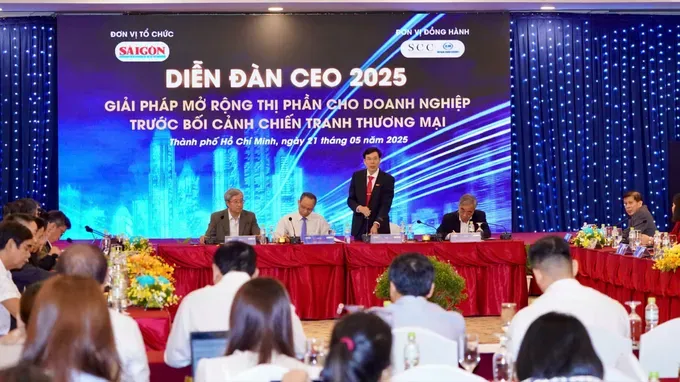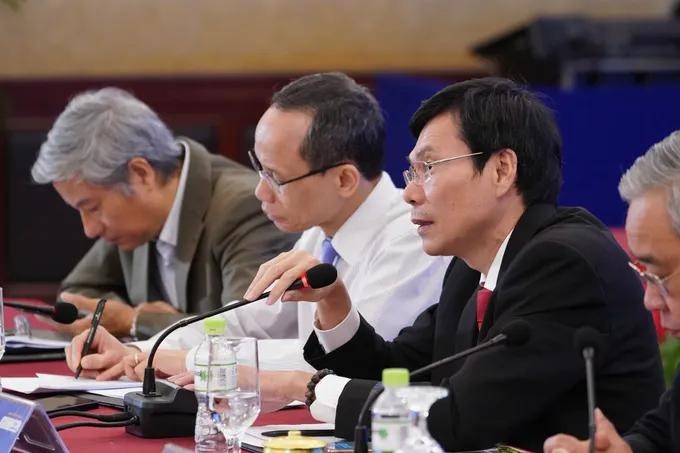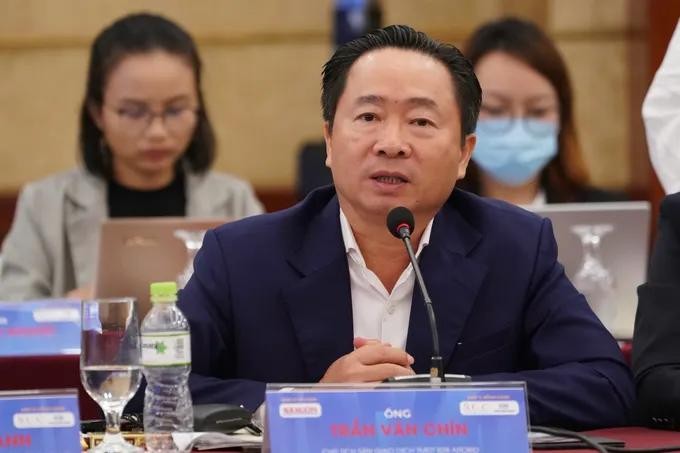Many experts and enterprises have proposed their solutions to develop the private economy while discussing at the CEO Forum 2025 'Solutions to expand market share for enterprises in the context of the trade war' organized by Sai Gon Giai Phong (SGGP) Newspaper, Ho Chi Minh City Institute for Development Studies (HIDS) and Ho Chi Minh City Business Association (HUBA).

Discussing strategies to enhance export competitiveness, Chairwoman Ly Kim Chi of the Ho Chi Minh City Food and Foodstuff Association emphasized that tariff and protectionist policies of various countries are having a significant impact. In the current global context, the food and beverage industry is not merely an economic sector—it also serves a broader social responsibility. It functions as a "soft shield" for the economy, helping to sustain production, employment, and agricultural value chains.
Ms. Chi proposed four key solution groups aimed at repositioning the export market in light of the challenges posed by tariffs. She noted that most small and medium-sized enterprises (SMEs), upon entering a major market such as the United States, often consider their export objectives fulfilled. This mindset hinders diversification efforts. To build resilience, enterprises must move beyond reliance on just one or two markets; otherwise, they risk significant setbacks when market disruptions occur.
She added that in the past few months, export growth has been good, but in-depth analysis in the food industry shows that during the 90-day pause on tarriff, enterprises have produced three shifts day and night to meet the 90 days. The association has advised export enterprises to find niche markets and the Halal market.

She emphasized that repositioning the export market requires both the exploration of new markets and the development of competitive advantages. In her view, embracing green and digital solutions is essential. Key capabilities such as energy efficiency and product traceability must be implemented. She also stressed the importance of ecosystem connectivity—when a small enterprise receives a large order, it should collaborate with others to fulfill production demands collectively.
Meanwhile, General Director of Secoin Vo Thi Lien Huong highlighted the need for businesses to take the lead in exporting high value-added construction materials. She acknowledged that Vietnamese enterprises have demonstrated significant resilience and effort in navigating the challenges posed by global tariffs and trade barriers.
Facing a 46 percent tariff, Secoin, a company with 60 markets and 50 percent of its trade in the U.S., swiftly engaged its supply chain. A U.S. supplier suggested sharing the tariff burden equally among manufacturer, distributor, and consumer. This led to a mutual decision to shift focus from price competition to researching and developing innovative and value-driven products.
Enterprises in the construction materials industry of Ho Chi Minh City attended the fair in Australia, with great support from Investment and Trade Promotion Center (ITPC), forming a group of enterprises to go together to find customers. Promotional activities must be targeted correctly and specifically. This is an effort from the Ho Chi Minh City government as well as the businesses themselves, creating a very good image of Vietnamese businesses in the eyes of Australian businesses. This is a good solution in the current period.
She emphasized that in the face of numerous external risks, businesses must focus on strengthening their internal operations by implementing the Japanese lean program. Lean management is essential for effectively addressing these external challenges. As global trade trends evolve, manufacturers and consumers are increasingly connecting directly, minimizing the role of intermediaries in a B2C model. This shift presents a significant opportunity for e-commerce, which can lead to substantial cost reductions.

Chairman Tran Van Chin of the AROBID B2B e-commerce platform noted that while the traditional business model has been successful for many years, there is now a heightened focus on digital transformation and green economic development, drawing attention from both central and local authorities.
To assist the business community in increasing market share and expanding their reach, various solutions are available. The AROBID B2B e-commerce platform is at the forefront of introducing a digital exhibition model on the B2B e-commerce platform, featuring booths that facilitate contract closures directly on the platform. Participation in the B2B platform offers businesses the chance to grow both domestically and internationally. It not only empowers local businesses to leverage their strengths but also serves as an effective tool for market expansion abroad. The initial step will be to launch the Vietnam-Singapore platform to help Vietnamese companies penetrate the Singaporean market.
Currently, Vietnam has 95 percent small and medium enterprises. In the future, when household businesses establish firms, the AROBID B2B e-commerce platform will create conditions for them to open accounts on the exchange free of charge for life.
Consumers willing to pay more for green products
Speaking on the theme of the domestic market of over 100 million people, Chairman Nguyen Anh Duc of the Ho Chi Minh City Retailers Association shared practical insights into domestic consumer behavior and how businesses must innovate to engage effectively. Specifically, personal spending remains cautious. The health of Vietnamese enterprises is also under strain, leading to a slowdown in spending and consumption. According to the Chairman, beyond tracking the number of businesses exiting the market, there should also be comprehensive statistics on businesses that are growing and contributing through tax payments.
There is a rising trend of product personalization and omnichannel shopping, areas where foreign-invested enterprises (FDIs) are significantly outperforming domestic businesses. Citing a survey, Mr. Duc noted that 97 percent of consumers expressed a preference for personalized experiences, despite concerns about data privacy. Moreover, 65 percent of consumers believe that a product or service should be available across all channels.
Health-consciousness and demand for green, clean products are on the rise. Consumers are willing to pay a premium for environmentally friendly and health-oriented products, yet the regulatory standards for such products remain incomplete. Notably, 74 percent of customers stated they are willing to pay up to 20 percent more for recycled and eco-friendly products.
Deputy General Director Le Duy Cuong of Saigon Cosmetics Joint Stock Company (SCC) emphasized that today's consumers, particularly the younger demographic, have evolved significantly and differ greatly from traditional consumers, especially regarding their demand for personalized experiences.
Currently, purchases are made on an individual basis, necessitating that businesses adapt and comprehend these changes. Young consumers are highly informed and prioritize transparency in quality claims, reputable brands, and sustainability. Their purchasing decisions are influenced by these factors, irrespective of whether the brand is local or international. Consequently, businesses should prioritize understanding and winning over consumers rather than fixating on competitors. It is crucial for Vietnamese companies to grasp the preferences of Vietnamese consumers, rather than allowing foreign brands to dominate this understanding and connect with individuals.
Deputy General Director of Saigon Co.op Le Truong Son said that the State needs to provide more policy support for cooperatives. Saigon Co.op is always deeply aware of its pioneering role in connecting Vietnamese goods with the domestic market. Therefore, it always prioritizes Vietnamese goods in its business structure, about 95 percent of goods in the system are Vietnamese goods, with priority given to high-quality, branded products, OCOP products and regional specialties.
The domestic retail market in Vietnam is currently worth about US$180 billion and is forecast to reach US$350 billion by the end of 2025, not only opening up great opportunities for retailers but also being an important time for Vietnamese goods to affirm their position in the domestic market. However, pressure from imported goods is increasing rapidly. The explosion of cheap imported goods with diverse designs, competitive prices and cross-border distribution systems is posing a significant challenge for Vietnamese goods.
On behalf of the Organizing Committee, Journalist Pham Truong, Deputy Editor-in-Chief of SGGP Newspaper, stated that besides sharing insights and perspectives from the forum through the media channels within the SGGP Newspaper ecosystem, the Newspaper will actively gather feedback, suggestions, and concrete solutions from businesses and experts regarding issues pertinent to business operations and the market amid the trade war.
This will help in identifying ways to adapt and contribute to the growth of both the city and the nation. He expressed hope that in the future, the organizer will leverage collective strengths, innovative ideas, and coordinated support among agencies at both central and local levels, thereby creating a pivotal moment in enhancing operational efficiency and producing high-quality products that enable businesses to excel and compete on a global scale.
























